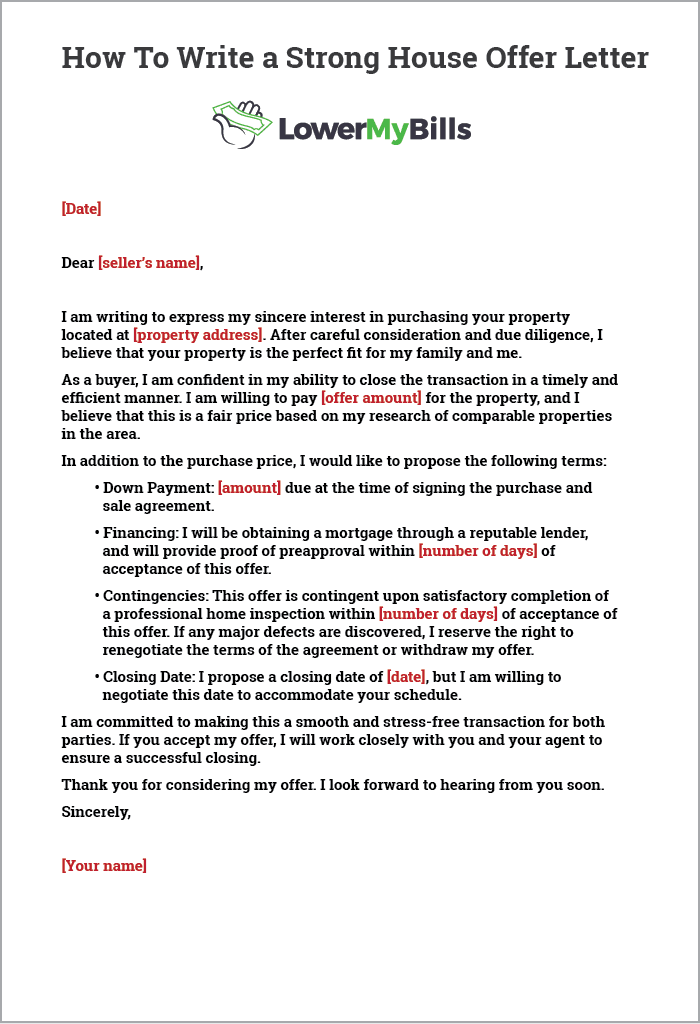In a competitive housing market, buyers look for any advantage they can get over other bidders on a property. Writing a personalized letter to the seller of a home has become in recent years a popular — and controversial — tool that potential homebuyers use to try to persuade sellers to choose their bid.
In the right circumstances, writing a strong house offer letter is worth considering when you’re in a competitive bidding situation.
Key Takeaways:
- A house offer letter can help you stand out from the crowd, but caution should be used.
- While the numbers are important, a friendly personal note could be valuable as well.
- Be short and to the point with your house offer letter.
What Is a House Offer Letter?
A house offer letter is a written letter to the seller of a home telling them a bit about who you are, why you want to buy their home, how much you would enjoy it, your ability to complete the sale, and why they should choose your bid over another offer on a house. An offer letter for a house personalizes your bid and ideally helps the seller see you as more than a number on an offer sheet.
But before you start writing, it’s important to know that the practice has been criticized as unfair, and that many real estate professionals discourage it.
“If you send a letter about yourself, and a photo, and that sways the seller’s opinion, it could be a fair housing violation, and puts the agent and seller at risk of being sanctioned by the (National Association of Realtors),” says Chris Galdieri, a Realtor with LoKation Real Estate in Pompano Beach, Florida.
When Is It OK To Send a House Offer Letter?
It’s not always a good idea to write a house offer letter.
The practice has been criticized for perpetuating housing discrimination. If you disclose information such as your race, national origin, religion, or other protected individual traits — even unintentionally — the seller could violate federal law by including that information in their decision on whom to sell their home to.
Oregon legislators passed a law banning such letters in 2021, but the law was challenged by a federal lawsuit and in 2022 was ruled unconstitutional as a violation of free speech. While offer letters are legal, prominent real estate groups — including the National Association of Realtors — advise their members against the practice.
Also keep in mind that cash usually speaks louder than any offer letter in a competitive market. Writing an offer letter on a house will help your chances only if it ends up being the deciding factor for a seller choosing between competitive offers.
Be sure to discuss with your real estate agent whether an offer letter is appropriate to write before preparing one for submission.
Must-Haves in a House Offer Letter
If writing a letter to a home seller works as part of your bidding strategy, there are a few main components it should include to be as strong as possible.
Start with a personal greeting
Address the seller by name. You can get that information from your agent if you don’t already have it. For example, it’s better to write “Dear Barbara and John” or “Dear Mr. and Mrs. Lee” than “Dear Seller.”
While you and your partner or spouse are trying to establish a personal connection, this is still a business letter, Galdieri says. At the same time, avoid being as formal as you would be in an email to your boss.
Be friendly
Remember that you’re writing to someone who likely takes pride in their home, and it could be a positive connection that makes the difference in your offer getting selected.
Share a few details about yourself
Let your personality shine a bit, and tell the seller about yourself. Include a few details about who you are, and explain why you want to buy the home.
“Find some common elements that you can share with the seller,” Galdieri says. Maybe you both went to the same school, or root for the same team. Any common ground you can find will strengthen your house offer to stand out when the seller is reviewing bids, he says.
Explain what you love about the home
The letter should be positive and convey what buying the home would mean for you and your future, Galdieri says.
“Explain that you will be a great addition to the neighborhood, and you would make a great neighbor,” he says.
If you want to live in the home, talk specifically about the things you like. If you love the kitchen, you could mention its layout is perfect for hosting the many family dinners you would have there. If the pool is more your speed, explain that you’ve always wanted to enjoy swimming all summer long with your friends and family.
Flatter the seller
Complimenting the homeowner could go a long way, especially if they’ve taken good care of their home. If you find out they’ve recently repainted, giving them a thumbs-up on their color choice can be a kind gesture, even if you plan on repainting. You also could compliment their interior decor, and say you would like to do something similar if you were to buy the home.
Include high-level financial details only
You might include a few high-level details regarding your finances, such as whether you’re preapproved for a mortgage, how much down payment you plan to make, and any earnest money you’re offering. The letter to the seller will be sent along with a formal offer that includes all the financial details.
Consider including an explanation of the rationale behind your offer, especially if it’s below asking price. Work closely with your agent on this, Galdieri says.
Lastly, include any other special aspects of your bid, such as offering to rent the home back to the seller if they need more time to move out after the sale, he says.
Include your essential contingencies
It’s likely that there will be some things you need or want as part of the transaction, and it’s important to list them to prevent any miscommunication. These contingencies could include:
- Home inspection contingency.
- Home sale contingency.
- Home appraisal contingency.
- Title contingency.
Contingencies give you the ability to back out of the purchase if something doesn’t meet your expectations. For example, if the home inspection finds structural flaws that need to be repaired, you can cancel the sale without penalty.
Keep it short
Everyone’s attention is scattered these days, and it’s unlikely the seller will read a 10-page offer letter. Do your best to keep it to under two pages, and get right to the point.
Close with a heartfelt thank-you
At the end of the day, your offer to buy a house will be considered against others, so you should thank the seller for taking the time to read your letter. Be sincere, truthful, and thankful. Use the emotional aspect of the house offer letter to your advantage, Galdieri says.
The home tends to have a deeper meaning to the sellers since they shared years of memories there. There’s an emotional aspect that the buyers can leverage if they can identify what the home meant to the seller.
Chris Galdieri, Realtor
Topics To Avoid in a House Offer Letter
When it comes to an offer letter for a house, shorter is better — you want to avoid giving too much information. Steer clear of the following topics when you’re writing a letter to a home seller.
Too much personal information
Leave out any information that could violate fair housing standards. This includes race, skin color, national origin, marital status, income, religious affiliation, and political beliefs.
Think of it like a first date, Galdieri says. If you wouldn’t mention the information on a first date, then it shouldn’t be mentioned in an offer letter.
Anything you want to change about the house
The sellers don’t want to hear about your plans to demolish the kitchen they love or to replace the shag carpet they think is absolutely perfect for the living room. And if you plan to rent out the home, keep that to yourself.
“Some sellers may be turned off to converting their home into a rental,” Galdieri says.
Too many financial details
It’s unnecessary to get into too many details of your offer in the letter. Doing so is more likely to raise questions or concerns than inspire confidence. Leave the specifics to your agent to submit on the offer sheet.
A family photograph
While including a family photo seems like a great way to create a personal connection, it may leave the seller and their agent open to discrimination claims, Galdieri says. It’s best to leave this out to avoid problems.
House Offer Letter Templates
Here’s an example of how to write an offer letter for a house that you can use as a starting point for your next home bid:
[Your name]
[Your address]
[Date]
[Seller’s name]
[Seller’s address]
Dear [seller’s name],
We are writing this letter to thank you for allowing us to see your beautiful home, and are very pleased to submit the attached offer.
We want to compliment your home, as it immediately struck us as a beautiful and comfortable place to live in. [Mention specific aspects of the home that you like.]
Let me tell you a bit about ourselves. [Add a few general details about yourself, and introduce your family. Avoid any mention of race, skin color, national origin, religion, familial status, disabilities, or political affiliations.]
[Talk about how the home’s features and location are a good fit for you.] We also love the neighborhood and how close it is to the school that our child attends. Moreover, your home is close to [place of work], and is near [amenities] we enjoy using in our free time.
We already have a mortgage preapproval letter for [amount] and are able to make a down payment of [amount]. Additionally, we are pleased to offer a 5% earnest money deposit of [amount].
If you accept our offer, we will do everything possible to expedite the closing process. We also can be flexible with the closing date, if necessary.
We would love the chance to preserve the character of your gorgeous home and garden, and build a life in your amazing neighborhood. Thank you again for your time and consideration.
Sincerely,
[Your name and the name of your partner or spouse]
[Your phone number]
[Your email address]
If you wish to stay a bit more professional and formal, you can follow this template:
[Date]
I am writing to express my sincere interest in purchasing your property located at [property address]. After careful consideration and due diligence, I believe that your property is the perfect fit for my family and me.
As a buyer, I am confident in my ability to close the transaction in a timely and efficient manner. I am willing to pay [offer amount] for the property, and I believe that this is a fair price based on my research of comparable properties in the area.
In addition to the purchase price, I would like to propose the following terms:
- Down Payment: [amount] due at the time of signing the purchase and sale agreement.
- Financing: I will be obtaining a mortgage through a reputable lender, and will provide proof of preapproval within [number of days] of acceptance of this offer.
- Contingencies: This offer is contingent upon satisfactory completion of a professional home inspection within [number of days] of acceptance of this offer. If any major defects are discovered, I reserve the right to renegotiate the terms of the agreement or withdraw my offer.
- Closing Date: I propose a closing date of [date], but I am willing to negotiate this date to accommodate your schedule.
I am committed to making this a smooth and stress-free transaction for both parties. If you accept my offer, I will work closely with you and your agent to ensure a successful closing.
Thank you for considering my offer. I look forward to hearing from you soon.
Sincerely,
[Your name]
Remember to avoid following any template verbatim. Your letter should be personal, so make sure it reflects your personality while expressing your positive feelings about the home and why you want to live there.
Also, be sure to proofread your letter, and have a friend read it over before your agent submits it to the seller.
Writing a Strong House Offer Letter FAQ
Here are answers to common questions about writing a house offer letter.
A house offer letter should be no longer than two pages. Galdieri suggests keeping it to one page — about 400 words.
It’s best to type your house offer letter and email it to your agent so they can easily forward it to the seller, Galdieri says. Writing out the letter by hand may appear more personal, but typing is quicker and prevents problems with handwriting being illegible or hard to read, he says.
An offer letter is not the same as a contract on a house. An offer letter is simply an introduction from you as the buyer to the seller.
The Bottom Line on Writing a Strong House Offer Letter
A house offer letter gives you one more resource to help you secure a home, especially if the situation is right and you’re in a tight housing market. Ultimately, it could make the difference in getting you the home you want.








